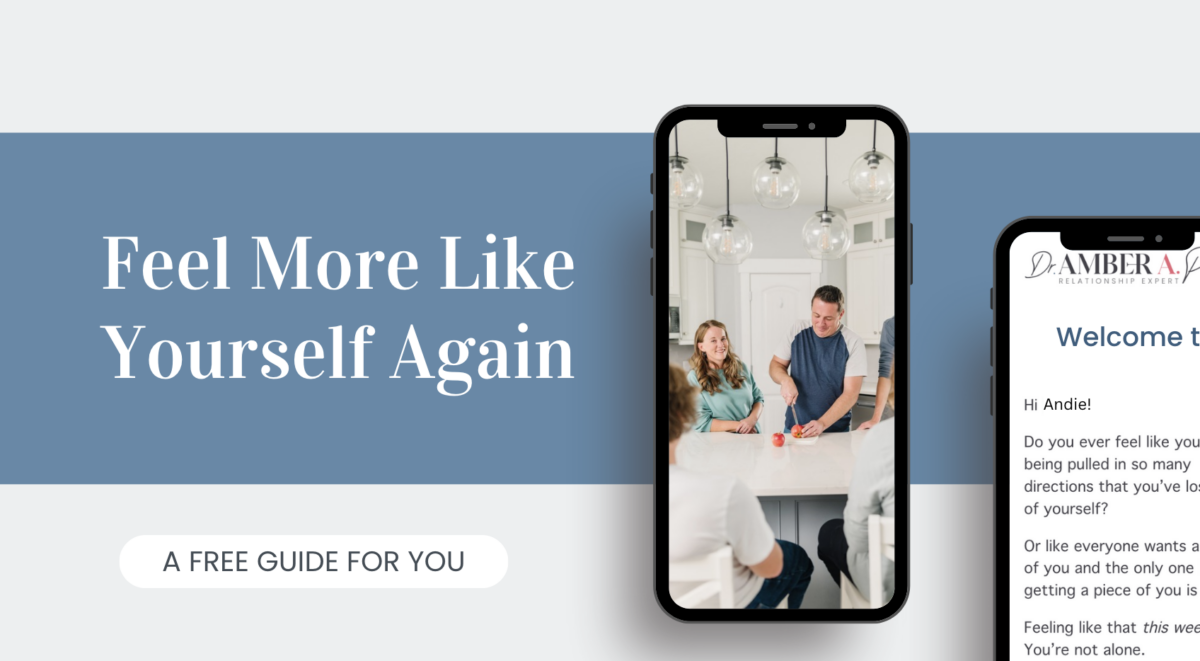
Like Listening?
Pop in those earbuds & listen to learn more about codependency on the Relate-Able Podcast
TLDR: Learning how to fix a codependent marriage involves recognizing codependent behaviors (things like self-silencing and emotional fusion) and working to fix them in yourself. It’s important to realize that this work has to come from yourself because you can’t change your partner’s behavior (because that’s literally the definition of codependency).
From the moment we are born, we want to be in relationships with other people. That’s a completely normal part of being human. Babies crave affection and need care from others to survive, and that desire for someone to care for us and love us doesn’t go away as we age. We want to feel like we belong with and matter to others.

So if you feel a longing for someone to love you deeply, you are normal. (Yay!)
The thing is, because we want the feeling of belonging and love so badly, we sometimes do things that create unhealthy relationships. So in essence, in our pursuit of acceptance, we damage the very thing we most desire—real connection with others. Whoops.
One of the biggest ways that this can happen in a marriage or in other romantic relationships is through codependency. Codependency, simply put, is an excessive focus on taking care of others based on a need to feel valuable. I’ve also heard it described as a “relationship addiction” and that’s very fitting. It means you rely on relationships with others to feel good about yourself.
So if you think about that desire to feel loved and accepted through the lens of codependence, you’re sacrificing yourself and appeasing another person hoping that they will love you and make you feel good about yourself. When this happens in marriage or other relationships, it can be terribly damaging, limiting the intimacy and connection you feel with each other, and even leading to abuse at times.
Let’s dig into this a little bit more to understand what’s behind a codependent relationship and how to fix a codependent marriage if you are in one.
What Does the Term Codependency Really Mean?
I already gave a brief overview of what codependency is, but let’s look a little deeper to understand it a little better.
As we already established, codependency often stems from a desire to be loved and cared for by others. Because of this desire, someone in a codependent relationship is likely to engage in certain behaviors that they hope will secure the relationship (it doesn’t work, but that’s the hope behind these choices).
To give you an idea of what some of these behaviors or choices might be, here’s a look at a codependency assessment that relationship experts or therapists use:
Measuring Codependency
(You can rate yourself on these to see which you might do. Think of it like a scale from 1-5 with 1 being “nope, I don’t do that” and 5 being “is someone watching me because they seem to know exactly what I do!”)
- It is hard for me to make decisions.
- It is hard for me to say “no.”
- It is hard for me to accept compliments graciously.
- Sometimes I almost feel bored or empty if I don’t have problems to focus on.
- I usually do not do things for other people that they are capable of doing for themselves. (reverse score)
- When I do something nice for myself, I usually feel guilty.
- I do not worry very much. (reverse score)
- I tell myself that things will get better when the people in my life change what they are doing.
- I seem to have relationships where I am always there for them, but they are rarely there for me.
- Sometimes I get focused on one person to the extent of neglecting other relationships and responsibilities.
- I seem to get into relationships that are painful for me.
- I don’t usually let others see the “real” me.
- When someone upsets me, I will hold it in for a long time, but once in a while, I explode.
- 1 will usually go to any lengths to avoid open conflict.
- I often have a sense of dread or impending doom.
- I often put the needs of others ahead of my own. (Fischer & Spann, 1991)
For every item that is true for you or that you rate higher on that scale, the more codependent behavior you are engaging in. If you see yourself in some (many of these) then just consider this progress in learning how to fix a codependent marriage. Because you can’t fix what you don’t see.
So, what do we notice in those items? A lot is going on there.
Want to Feel More Connection in Your Marriage?
Get a Free Guide to the 3 Most Common Challenges in Marriage & How to Fix Them
Self-Silencing Behaviors
You might notice that many of the items (like 2, 6, 13, 14, 16) refer to putting others’ needs ahead of your own, holding back on sharing personal feelings, avoiding conflict, and feeling bad about taking time for yourself. These behaviors collectively have a name: self-silencing.
I’ve written previously about self-silencing (read this article if you want to understand it better), but to sum it up, it’s stifling who we really are when we want other people to love us. We feel like maybe if we were our “real” selves (look at item 12), people might not like us, so it’s best if we just do what we think other people want us to do and avoid rocking the boat. These are people-pleasing tendencies and lots of us do that.
In case you’re wondering how well that works out…it doesn’t. Self-silencing is associated with depression, anxiety, physical health challenges like cancer, HIV, or IBS, less intimacy in a romantic relationship, less sexual satisfaction, and less relationship satisfaction. In other words, it’s an awful way to live (and yet so many of us are doing it). Let’s fix that!

Emotional Fusion
Other items on that assessment have a lot to do with something called emotional fusion. Unsurprisingly, the term codependent is almost interchangeable with emotional fusion. (I’m not just making that up. I’ve literally run statistical analyses with each and found the same results.) The reason these two terms have different names is that codependency was originally used to describe what often happens in situations with substance abuse when one person enables the other. Emotional fusion tends to be used more in describing romantic relationships and other close relationships.
Because the term codependence has often been used to describe problematic behavior associated with addiction and abuse, some people might be engaging in emotional fusion in other ways in their relationships without even realizing it. It can happen to anyone (and honestly does. Most people are doing it to a pretty big degree.)
Emotional fusion can be defined as an inability to function without relying on others to make you feel good about yourself. Look back up at items 1, 5, 9, and 10, for example. When you are emotionally fused, you do the things you do to seek approval from the person you are doing them for. If you don’t get their approval, you have a hard time functioning. You have a fear of rejection. That’s codependent.
You are also unlikely to be able to regulate your own emotions and you probably merge your identity with theirs (item 10).
Like self-silencing, emotional fusion really limits feelings of connection in a relationship. (Read more about that here.)
What to do if You’ve Got Codependency Issues in Your Relationship
So we’ve taken a quick look at what some signs of codependency might be, but what you really want to know is how to fix a codependent marriage or other relationship. Let’s talk about that.
First of all, props to you for seeing that you are in a problematic relationship and wanting to work on it. The fact that you see that these things are a problem is a HUGE first step towards change.
But here’s how you can move forward knowing that help is needed.
Build a Strong Sense of Self
The first thing to know is that you cannot change the other person. Please understand that. You cannot. You don’t have control of your partner’s actions, your partner’s feelings, or your partner’s needs. And frankly, you aren’t responsible for them. (You get the chance to choose to love that person, but you can’t make them feel a certain way or take away negative feelings or any of that.)

But you can change you. So that’s good news.
You will need to work on taking a deep look at your own behavior and your own needs and then address areas in yourself that need to change. This is not easy work, but it is worth it.
The best way to do this is to work on strengthening your sense of self. Codependence is very much associated with having a weak sense of self, so strengthening it will go a long way.
How do you do that? Again, this is something that I talk about a lot and you can read more here, but in general, there are a few things you need to know.
How to Strengthen Your Sense of Self
First, having a strong sense of self involves having a clear idea of who you are. It might be that you’ve merged yourself with others so much that you’ve lost sight of what makes you you. So taking some time to figure that out and rediscover yourself will be helpful. It’s also going to help if you can combat any feelings of low self-esteem and get comfortable with who you are.
Combatting Self-Silencing
But even more importantly, you need to start watching yourself for the behaviors we’ve described that are related to codependence. To combat self-silencing, you need to believe that who you are matters in an intimate relationship. The other person has no one to connect with if you just don’t even show up as yourself, right? You can’t keep stifling your thoughts and ideas or trying to earn the other person’s love and approval if you want a connection in your relationship.
So watch yourself and see what you find. For example, can you catch yourself holding your tongue about something really important to you because you don’t want to rock the boat?
Can you find a time when you hold back on being who you really are because you are embarrassed about yourself?
What about doing things for others or saying yes to things to try to prove that you’re valuable as a person/spouse/friend?
These will look different for everyone, but if you pay enough attention, you will see it happening and you can then try to stop that behavior. This will take time. Be patient with yourself.
Combatting Emotional Fusion
You also need to find ways that you rely on your partner for validation. Do you defer to your partner when a decision needs to be made because you can’t stand the invalidation of them not liking what you choose?
Do you struggle to regulate your own emotions? Maybe you snip at your partner after you’ve had a bad day. Maybe you take on your partner’s emotions and feel ownership of their bad day. Both of these are signs of emotional fusion.
Do you criticize your partner or try to control them? This is likely because you are emotionally fused and can’t stand the idea of them being independent and making their own choices.
You’ve got to start spending time doing some serious confronting of yourself on your own feelings that are related to codependent tendencies. When you can spot it happening in your life, then you can challenge yourself to stop doing it. Disengage from those tendencies. Little by little, you will make a change. It will also help to identify some of your individual interests, things you like to do, so that you can develop those.

This is SO Important Though
Remember that you are in charge of your own life, your own happiness, and your feelings, your behaviors, actions, and choices. This is not something your partner can fix for you any more than you can fix your partner’s problems. This will take a lot of emotional development on your part and it will take time. Again, be patient with yourself.
The most important thing to remember is that to break out of codependency in a relationship YOU must stop engaging in codependent behaviors. This has to start with you.
What Happens When You Stop Codependent Habits?
Here’s one thing I really want you to know. When you begin to stop doing the learned behavior of codependency that you are used to, this might shake your relationship up in ways that you didn’t anticipate.
As codependent people, you’ve probably been living this way for a while. And when you make changes to yourself, your partner will notice. And it will likely feel very uncomfortable for both of you. This can be really difficult.
You will have to work hard to hold on to what you are trying to do. Because you’re both used to acting with bad habits and playing off each other, it will be very tempting to step right back into that when your codependent partner is faced with the changes you are trying to make. They might even try to suck you because it feels more comfortable to keep doing what you’ve always done. You will be tempted to reengage in unhealthy ways of self-silencing or emotionally fusing. You will need to stand strong against this temptation.
As you act with a strong sense of self, as you let go of self-silencing and emotional fusion, your partner will be forced to confront their own codependent behaviors. This may really challenge your relationship. But if you really want to fix a codependent marriage, you’ve got to keep working and not give up. It’s not a bad thing to take time to work on this.
Healthier relationship dynamics will come in the long run, but it will take some work on your part. Be patient with yourself and let yourself grow into this.
This is Not Easy (But it IS Worth It in the Long Term)
I can’t emphasize enough that this will take work and it is not easy. It is absolutely worth it if you want the type of relationship that enjoys genuine connection and intimacy.
It is also a wonderful idea, even critical if you are really struggling, to seek professional help. As a couple, you may want to find a therapist that specializes in the concept of codependency. This can be very helpful to have someone help you work through this.
Get Help Here
One of the best things you can do for yourself and your relationship is to strengthen your sense of self.
Here are 2 great ways to begin that process:

FREE Guide:
Me Again
A Simple Guide for Moms Who Want to Feel Like Themselves Again
Actionable Tips Right to Your Inbox!

End Codependence:
Join Reconnect
An in-depth program for couples aiming to move from “fine” to fabulous. Reconnect offers weekly activities & insights to rediscover intimacy, beat unhealthy relationship patterns, enhance communication, & bring fun back into your partnership.
Learn More About This Program Here:
Fulfilling Connection with Yourself & Others







